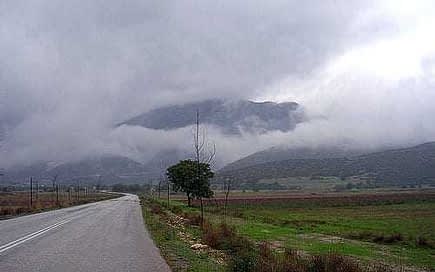300 liters or nearly 80 gallons. That’s the most homemade olive oil one Greek family bought at once from Yiannis and Mina Roboras, who have been producing their own olive oil in the Peloponnese region of Greece for more than 20 years.
“It a long family tradition,” Mina says proudly. “Our olive oil is special because our mountains haven’t been spoiled by industrialization as other areas have. Our olive oil is 100 percent pure and we think — better quality than in the stores.”
The Robaras’ live in the sleepy village of Klimendi, high in the mountains of Korinth. They describe their village as “old but beautiful” with its traditional stone houses, rolling mountains covered with olive and mandarin trees and white and red grapes which they also harvest to produce wine and sultanas.
The Robaras’ advertise their olive oil as rich green in color and sell it in 17 kilogram or 37.5 pound tanks. The tanks, which are large and rectangular in shape are a common find in the average household in Greece, where olive oil consumption is the highest in the world.
“It’s cheaper to buy in bulk than in small sizes at the supermarket where one liter might only last you only a week at up to twelve euros, depending on quality,” says Yiannis, explaining why the aluminum tanks are so popular.
The Robaras’ describe their clients as friends, friends of friends, neighbors and relatives. Sometimes they sell their olive oil at local fresh produce fairs. They say a 17 kilogram tank, which sells for 65 euro, will last a Greek family for up to six months.
“Olive oil is an absolute necessity and it’s very important to us Greeks. It is part of our culture and we use it for all cooking and sometimes for moisturizer on our skin and hands. It is considered a gift from the Gods,” says Mina.
Christos Peroukaneas, also produces olive oil from his family’s land. From his experience he says a 17 kilogram tank can last as little as three months for an average Greek family.
“They are popular because we Greeks use olive oil for cooking absolutely everything and the tins are simply easier to transport. Although, I believe the oil should be poured into shaded glass bottles when they make it home and stored that way for the best result,” says Peroukaneas whose olive trees grow in Mani, another famous olive oil producing region in the Peloponnese region of the country.
Peroukaneas began traveling from Athens to his village, Germa, nearly a decade ago to actively be involved during harvest season. Since several wildfires destroyed some of the trees which have been in the family for more than 300 years, he’s only managed to produce about two tons each year, half of what he’s capable of producing.
He says the money his family makes from the olive oil is just supplementary income and not something they can rely on but every season he looks forward to harvesting and producing what he can from his grove, simply because he loves producing and selling something dear to his family and dear to his country.
“In the end it’s so satisfactory to create good food that is part of a yearly effort and a result of full teamwork. Olive oil is a product that means so much to a Greek family and so much to Greece in so many ways.”










